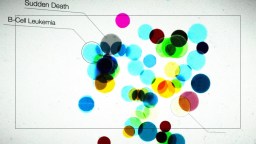It’s not unusual to hear someone openly say that they can’t do math at all; that they can’t figure out the percentage to tip on a bill. If someone said that chemistry hurts their brain and they can’t even look at an equation, or that they have no idea how a certain part of the human body does what it does, that wouldn’t be too surprising. These are usually light-hearted statements that go down well – many of us would sympathize, nod and say: yeah, me too.
But turn the tables and imagine someone announcing jovially they can’t read words that are over 3 syllables, or that a certain sentence is too beyond them to even try. That wouldn’t be considered funny. En masse, we’d raise our brows and say: Excuse me?
The ignorance involved in both scenarios is comparable, but the shirking of effort when it comes to science and math is so normalized we don’t always catch ourselves.
This is the bee in Bill Nye’s bonnet today. An engineer by origin, he wants science literacy to be a national priority so that people can understand that the daily magic around them every day – all the technology, medicine, and innovation that makes our lives easier, isn’t some kind of wizardry – it’s cold, hard science. Understanding the way things work, from the basics to a minute level, is so profoundly important to a country’s progress and its citizen’s health and daily lives. As an example, Nye looks at the spread of a disease like Ebola in North America compared to Africa; the education levels about how germs are transmitted corresponds directly to the amount of deaths from this terrible illness. Understanding basic concepts like bacteria and hygiene saves lives.
Nye goes on to make an interesting point about some of the U.S.’s elected officials and their fluctuating stance on science. Those who panicked about Ebola – rightly so – and implemented preventative measures take a very different approach when it comes to a crisis such as climate change. Here, the U.S. has failed to make meaningful change and start measures to look out for the future. Nye also points to officials who cut funding to the Center for Disease Control, which demonstrates a serious lack of literacy about the nature of infectious disease. The Spanish Flu of the early 20th century killed an estimated 20-50 million people – even at its most conservative estimate, that’s more than all the deaths in WWI. In Nye’s words, cutting disease research is “not where you save your money, Congress!”
There is also a general mistrust of science among civilians and leaders, and unfortunately shady science practices, such as the sugar industry buying off Harvard scientists to write negative studies focusing on fats while omitting research that would hurt the sugar industry, does a lot of damage to the public perception of scientific method. Those stories make it a little easier to believe scientists can be bought, and therefore that science as a whole can be doubted.
But science largely stands strong, and research by Dan Kahan at Yale University shows that those with the strongest views tend to have the greatest scientific literacy. Kahan asked 1,540 Americans to rate the severity of climate change as a global threat on a scale of zero to ten. Interestingly those that rated it closest to zero or closest to ten had the highest levels of science comprehension.
That middle ground proves to be a dangerous place because the greatest sin in science is to not ask questions, and not challenge conventional wisdom. That’s the whole point of scientific enquiry, but dismissing it or failing to understand it really is a crime, especially when you trace it to the tangible cost of human life from increasing natural disasters and preventable contagions. This idea is perhaps expressed best by Canadian-American physician and Nobel Laureate Charles Huggins, who said: “Nature can refuse to speak but she cannot give a wrong answer.” Science, when not corrupt, works as nature’s translator. We have to trust it, not be blindly skeptical.
Bill Nye has spent his life promoting science education and while here he is visibly frustrated by this high-level mistrust of science in the U.S., another famous champion of science, astrophysicist Neil deGrasse Tyson, brings reinforcement in the form of optimism. Tyson recently said to the Wall Street Journal: “Science is being born into public consciousness in a very big way, for the first time. And we’re doing it on the shoulders of those who struggled to get it going in that regard. I look forward to the impact it could have on the 21st century, where we have a next generation of people who only know science literacy as a fundamental part of an educated citizenry.”
Bill Nye’s most recent book is Unstoppable: Harnessing Science to Change the World.
Bill Nye: Ebola’s a classic example for me from an evolutionary standpoint of germs and parasites being your real enemy as a big animal, a multicellular organism. Everybody’s terrified of Ebola because you can’t see it and as the saying goes this is not my idea. People aren’t afraid of dying so much as they’re afraid of how they’re going to die. And the Ebola death looks horrible. It’s awful. And what’s making it worse in Africa in particular is scientific illiteracy. People not realizing that these microorganisms get passed from one to another. When I was in South Africa – I guess it’s five years ago a guy told a story – he was from a village, a small village. He was working for the South African Space Agency which they have. And he says it’s going to villages where kids have never seen a magnet and they recommend that you don’t go near that tree because the lightening bird landed on that tree and that means that tree will get struck by lightning and the tree branch will fall on you. And that’s not true by the way. So by having a population of people who don’t really understand germs and how serious they are, the germ gets spread really readily. As far as people freaking out here in the U.S., it’s appropriate. However, the same legislatures when it comes to climate change say well I’m not a scientist. I can’t have an opinion on climate change sure have a lot of opinions about Ebola. There’s a faction of our leaders, elected officials, who continually cuts the budget for the Centers for Disease Control which, to me reflects an ignorance of how serious germs can be.
I remind us all that in 1918 more people died of what was called the Spanish Flu than died from World War I which killed a lot of people. The Spanish Flu killed – the estimates vary but about 50 million people died of the flu. And when you think of the flu you think oh, the flu. You take Theraflu. You take chicken soup. You’ll be fine. What, cannot take penicillin. Ineffective against a virus people. Not going to help you. Penicillin is not going to do anything against Ebola. With that said it’s very reasonable that researchers, diligent researchers will be able to develop a vaccine against Ebola. It’s very reasonable. And so in my opinion we should be supporting that research full bore. But at the same time don’t curtail research in other germs which is going on at the Centers for Disease Control, for example, all the time. That’s not where you save your money Congress. But if you don’t believe in the seriousness of it and you have a mistrust of scientists, if you have a mistrust of engineers, you’re not going to help us out with that, are you. So it’s a very serious concern of mine.
And if everybody were talking about climate change that we were talking about Ebola we’d be working on climate change pretty steadily also. So it’s another lesson. You know, we – on my side of it in the science education world, I mean, this whole thing is so frustrating. The United States used to be the world leader in technology. But when you have this group of leaders, elected officials who are anti-science you’re setting the U.S. back and then ultimately setting the world back. So we should support the health workers that are going to take the risks and go to the hot zone.
We should support African governments and enable to the extent possible science education so that people are more literate about this. It’s a really difficult problem but solvable, solvable problem. I’d like to make another comment that occurred to me as an engineer. Everybody – I saw a story this morning about these home elevators that have ruined people’s lives. Kids have gotten their – these horrible head injuries from home elevators which aren’t subject to the same standards as elevators in commercial buildings. And that’s another thing where if you had extraordinary supervision over children they wouldn’t get in this trouble. On the other hand if the elevators were designed better the kids wouldn’t get in this trouble. And it just shows you how much we need – how much we rely on engineers. I’m sorry, these people who designed the elevators did their best. They didn’t think of the ten year old getting his head trapped in there. But after it happens we can make design changes so it never happens again. When people apparently loaded up their key chains so they’re so heavy that they were able to overcome the detent, the stop, the can’t turn it past park of the ignition switch in these Chevrolet vehicles and people crashed the cars because somebody in the ordering department thought it was okay to have the pin a little shorter than it was last year.
And so the pin didn’t hold the detent as it’s called to stop as strongly and it was able to cause these enormous problems. We rely on engineers to solve these problems and I, as an engineer, we do our best. We anticipate these things. But you can’t anticipate everything and this is part of evolution. Future ignition switches will not have that problem for a number of reasons. First of all some people got seriously injured. And then we have laws to hold corporations accountable for these serious injuries. And then we have systems in the corporation to make changes and enforce it. This is civilization and it’s top down and bottom up at once. And I as an engineer just want to remind people just how many moving parts there are in a car and how well they work. I’m not making excuses. I’m just saying stop and appreciate how complicated these things are and how we all take it for granted and they are all absolutely a result of science literacy. Of having a population of people who understands the significance of science in our everyday lives. And to eschew that or set it aside or not support basic research is not in anybody’s best interest. This is not a controversial statement but somehow I find it very frustrating when stuff like that happens and we all take it for granted. So I’ll start pointing fingers without realizing what’s involved. We can change the world people. We can change the world. Let’s go.







